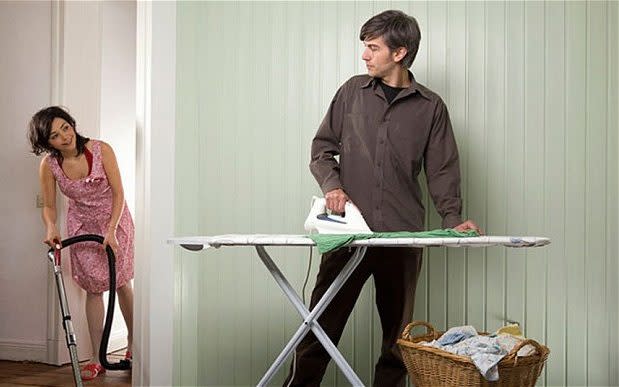How not to hate your husband after having kids

One afternoon, a few months after my daughter was born, my husband Tom was sprawled on the couch, eyes glued to the Tour De France. As I fed Sylvie, I asked him if he would tackle the mountain of laundry she had amassed. “But I did it last time,” he said. My pulse began to race as I explained that if we were taking turns, I was about a hundred loads of the stuff ahead.
“Later,” he insisted, his eyes transfixed.
I promptly erupted, calling him every profane name I could think of. Granted, I was reeling from sleep deprivation and ping-ponging hormones, but afterwards, I was mortified by my outburst. It didn’t stop there, either: Tom and I fought daily after our baby’s arrival, arguing over his habit of making plans and breezing out the door without consulting me, which of us deserved to sleep in on a Saturday, and why I was doing all the cooking.

I couldn’t bring myself to confide in friends or family, assuming every couple with a baby was handling parenthood more competently: an easy assumption to make in the stagecrafted world of social media, where every beaming parent with a newborn is #SoBlessed. I had been warned by friends that there would be an uptick in our fighting - indeed studies show that two thirds of parents are unhappy after the birth of their first child - but I feared that we would be the first couple in our circle of friends to split up.
These ongoing battles can cause irreparable damage, both to marriages and children. I thought I could yell with impunity when our daughter was a baby (it’s not like she can understand me, I told myself) but a U.S. study found that babies as young as six months old have a stress response by their parents’ agitated voices. If we (well, I) weren’t yelling we retreated into frosty silence. Or—worse—the tone of voice we used with each other was curt, but sweetly indulgent with our child.
Tom and I fought daily after our baby’s arrival, arguing over his habit of making plans and breezing out the door without consulting me, which of us deserved to sleep in on a Saturday, and why I was doing all the cooking
Writing about health and psychology for a living only made our precarious relationship more awkward. So I decided to try and salvage our faltering marriage by using every resource I could think of: for over a year, I plunged into research, consulted countless experts, divvied up chores with the help of time management experts and brought (well, dragged) my husband to couples therapy. The result was an upward spiral: when Tom began to help me out, I was happier, which in turn made him happier. When we learned to disagree calmly, our child grew calmer.
These days, of course we still squabble—how annoying would we be if we never fought again?—but with effort, we now work out issues like grown-ups. And I feel slightly less shame about our fighting as friends and family have come forward and confessed similar problems in their own marriages. One whose marriage I envied told me, “oh, I hated John until our son started school.” Another said that she and her husband had all but stopped talking to each other for the first two years after their twins were born. Two years? I had been none the wiser.
Here are the most valuable lessons we learned.
Ditch the ‘L’ word

Feel like putting a task off until ‘later’? It’s probably best for husbands to avoid that term entirely, advises psychotherapist Jean Fitzpatrick. It’s a word that especially rankles mothers, she says, because they tend to be the ones doing time-associated tasks that involve tight deadlines, such as feedings and school runs. Tom has avoided so many fights simply by giving me a time—even a vague one such as ‘by tomorrow’— for when he will do something.
There really is a blueprint for fighting properly

When an issue arises, start with a disarming “I” statement rather than “you,” suggest married couples counsellors John and Julie Gottman. Saying “I feel overwhelmed and wish you’d do the washing up” gets more compliance than ‘you never do the washing up,” which just makes your spouse defensive and angry. Describe what’s happening without judgment (‘attack the problem, not the person’ to use counsellor parlance). State clearly what you need, admit your role in the argument, even if it’s minor, and if you’re repeatedly clashing over an issue, one simple question can cut to the heart of the matter: why is this important to you?
Don’t shut him out

I realised I was complaining about my husband’s lack of involvement in our child’s daily care while simultaneously pushing him away because I secretly felt I did a better job. Psychologists call this ‘maternal gatekeeping’—keeping Dad at bay by criticising or shutting him out, which can put off a hesitant father - sometimes permanently.
I started paying attention to how often I was making him feel inept, such as leaping in to correct how he dressed or bathed our daughter, or making offhand comments like “hello, that’s not how she likes her toast!” Now I involve him in everything, including every email regarding our child, from play date plans to teacher interactions.
By taking over most of the domestic work, I was also buying into what Dr. Clare Lyonette from the University of Warwick terms “the myth of male incompetence”—that men can’t do chores. It doesn’t take a Ph.D. to empty a dishwasher.
Clearly divide household tasks

Yes, family meetings are hideously boring—but as expert upon expert told me, conflict arises when your roles are unclear. Rather than bicker endlessly about who most deserves a break from changing nappies, it saves time and energy to divide all chores from the get-go. Yet I was still doing more of the work, until I received this tip from psychologist Joshua Coleman, author of The Lazy Husband. He told me to watch my husband for a few weeks, note the things he can’t tolerate if they’re not done, then take them off my plate and plonk them onto his.
Tom can’t tolerate lateness so now he takes Sylvie to swim lessons and does the bills. He twitches if beverage supplies run low. All yours, darling!
“Date nights” are a must

Tom and I had become so child-centric that we had completely neglected our marriage, so we surveyed other parents for innovative ways to connect, like starting work an hour later and going for breakfast after the children are at school. Or try something new together: neuroscientists have found that novelty activates the pleasure centres of our brains. We also take ten minutes at the end of each day to talk about anything—anything— except our child, scheduling logistics, and money.
Recently I was taking our daughter, now seven, to school, and as she spotted some friends, she quickly dropped my hand.
“Then she ran into school without looking back,” I haltingly told my husband afterwards. “I’m not cool enough for her anymore. It’s happening already.”
Spotting my quivering lip, Tom grabbed my hand and dramatically pronounced that he still thought I was cool. I laughed and waved him away, but I did appreciate his unspoken message: I’m still here, and I’ll hold your hand.
How Not To Hate Your Husband After Kids by Jancee Dunn is published by Hutchinson (£14.99). To order your copy for £12.99 plus p&p call 0844 871 1514 or visit books.telegraph.co.uk

 Yahoo News
Yahoo News 